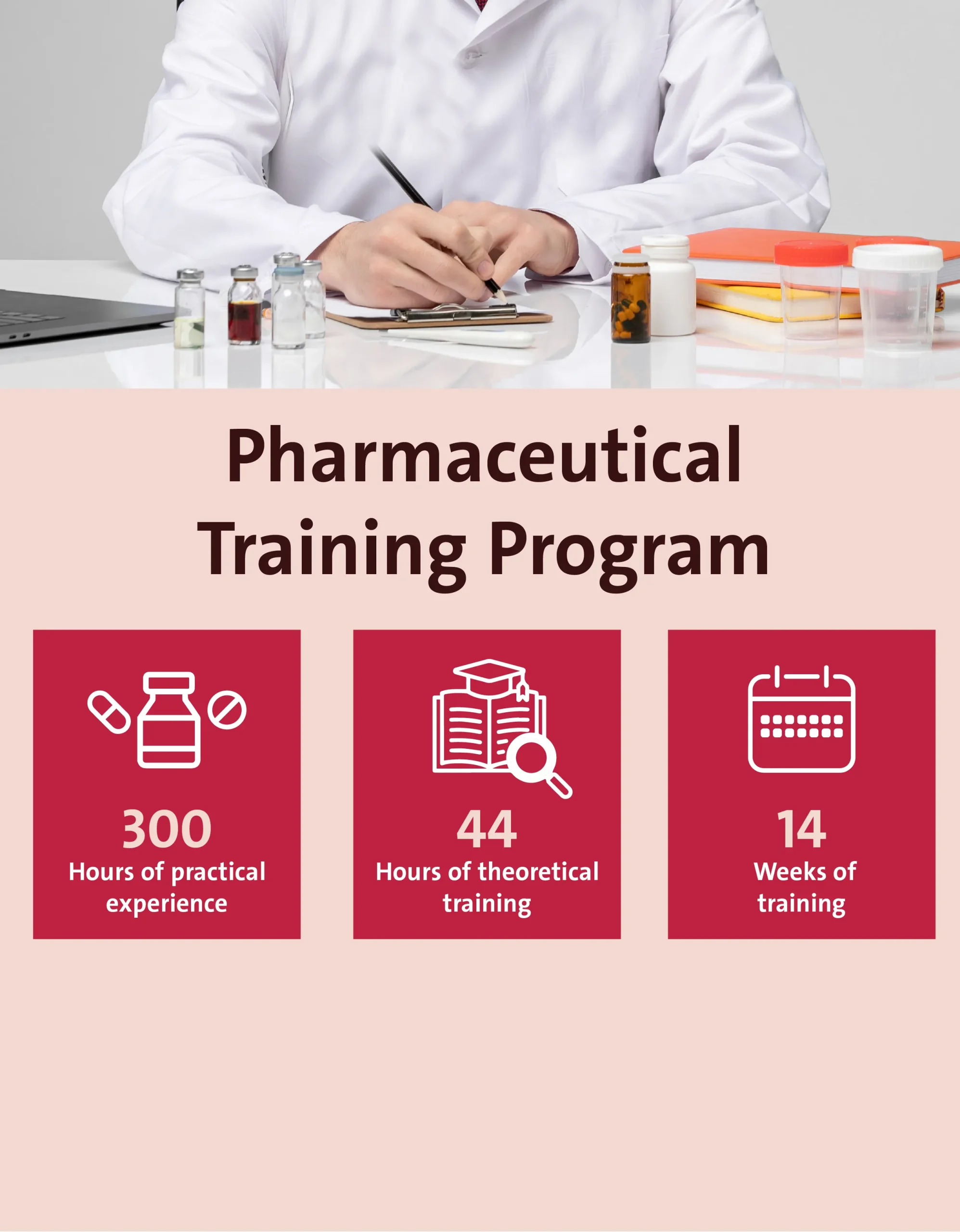

This training course is specifically designed for pre-graduate pharmacy students to equip them with comprehensive knowledge and practical skills in the pharmacy sector. The course includes modules on communication skills, over-the-counter medications, infectious diseases, skin care, family planning, and more. Through lectures and practical sessions, participants will gain the ability to assess and manage a wide range of medical conditions, preparing them for the job market

:What You Will Learn
-
-
-
- Develop effective communication skills in the pharmacy sector.
- Acquire knowledge about over-the-counter medications and their proper use.
- Understand the diagnosis and management of common infectious diseases.
- Learn the basics of dispensing ophthalmic and otic preparations.
- Master skills in managing gastrointestinal disorders.
- Explore best practices in skin care and daily routines.
- Understand the principles of family planning and reproductive health.
- Gain knowledge about medical insurance procedures and terminology.
- Learn about the appropriate use of supplements and their interactions.
- Acquire knowledge about managing chronic diseases and patient counseling on medications.
- Understand the basics of baby care and infant nutrition.
- Prepare for real-life scenarios through role-play and practical assessments.
-
-

:Course Content
OVER THE COUNTER MEDICATION
Improve knowledge and basic skills required for diagnosis and history taking for basic OTC cases
:Develop basic skills to evaluate and manage different cases including
Common cold –
Influenza –
Allergic rhinitis –
Cough preparations –
Cover basic OTC analgesics –
Master counselling skills of main OTC cases –
OPTICAL & OTIC PREPARATIONS
Identify common eye disorders (eyelid & surface ocular disorders) and select the right treatment for each case
List some eye drops that are used to treat special cases (glaucoma and eye pain)
Distinguish between different types of eye lubricants
Describe common otic disorders and select the right treatment for each case
GIT DISORDERS
:Develop evaluation and management skills of gastrointestinal common disorders including
Gastric ulcer –
Helicobacter pylori infection –
Gastro-esophageal reflux disease –
Irritable bowel syndrome –
Build up knowledge about non-pharmacological measures –
Help relieving patients with diarrhea and constipation –
SKIN CARE & DAILY ROUTINE
Identify skin structure
Differentiate between different skin types
Identify different types of sunscreens
Describe the basic skin care routine for each skin type
Cover some special cosmetic preparations
:Identify basic skin disorders including
Acne –
Eczema –
Hyperpigmentation –
Fungal skin infections –
Under eye and body care –
FAMILY PLANNING & HEALTH
Understand the physiological role of main sexual hormones
Describe the meaning of family planning
Differentiate between different contraceptive methods
Help each patient choose the most suitable pregnancy planning method for her case
Identify hormonal medications and main supplements related to infertility
Provide full education related to polycystic ovary syndrome and describe suitable planning treatment for each case
Help each patient choose the suitable treatment related to postmenopausal syndrome
Differentiate between different male sexual disorders and provide full patient education
:Manage some minor complications related to pregnancy, including
Morning sickness and heartburn –
Constipation and hemorrhoids –
Headache –
Coagulation disorders –
INSURANCE
Recognize the main insurance companies in the field
Master the general dispensing rules and protocols between different insurance companies
Comprehend the specific terminology of insurance companies, and most commonly used medical terms
Deal with different company’s online websites
SUPPLEMENTS
Recognize the drug-nutrient, nutrient-nutrient interactions and avoid their collision to maximize their benefit
Identify each supplement and what they do for the body
Relate supplements to certain health conditions and determine when to give them over the counter
Build knowledge about the crossing of chronic medications of patients with supplements
INFECTIOUS DISEASES
Classify antibiotics and identify the alternatives of each generic antibiotic
List the main adverse effects and contraindications
Summarize pregnancy & lactation categories
List the clinical manifestations and therapy of the main common GIT, UTI, and respiratory system infectious diseases
Calculate antibiotic doses for the main cases
Provide full patient education and counseling related to antibiotics
Identify other microbial infections
BABY CARE & MILK FORMULAS
Identify basic baby care tools
:Manage common problems related to infants
Infant colic and flatulence –
Constipation –
Common cold –
High temperature –
Distinguish between the major infant milk formulas and choose the most proper one based on age and physical conditions
CHRONIC MEDICATION MANAGING
:Build knowledge about selected topics related to chronic diseases including
Diabetes mellitus –
Hypertension –
Selected CNS medications –
Antipsychotic drugs –
Tricyclic antidepressants (TCAs) –
Selective serotonin reuptake inhibitors (SSRIs) –
Serotonin-Norepinephrine reuptake inhibitors (SNRIs) –
Mixed serotonergic medications –
Provide patients with professional counseling about their medication –
Teach patients how to use an insulin pen –
CNS and Respiratory medications
• recognize the types of neurological and psychiatric medications and their uses.
• identify the potential side effects of neurological and psychiatric medications and respiratory inhalers
• Recognising the distinctions between various inhaler types and their appropriate administration techniques
• Participants will appreciate the importance of patient education on neurological and psychiatric medication and respiratory inhaler use.
